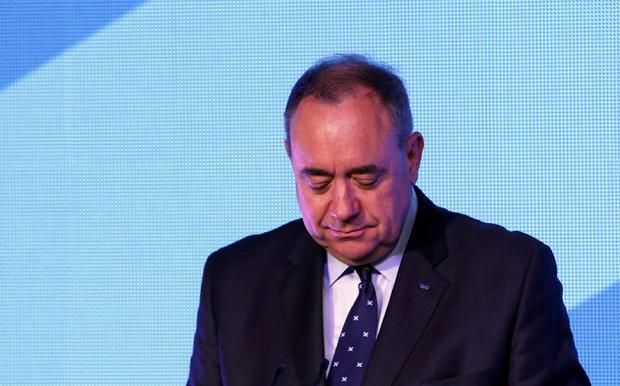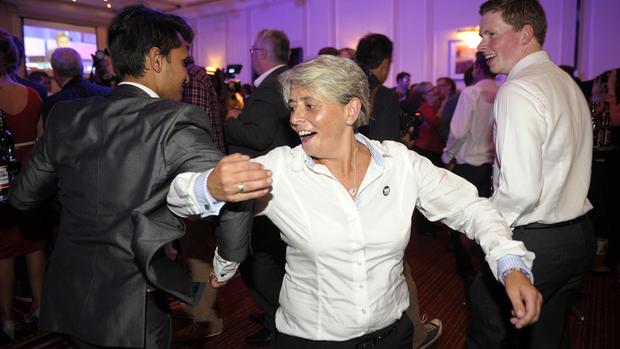Britain breathes a collective sigh of relief
EDINBURGH, Scotland -- Scottish voters have rejected independence, deciding to remain part of the United Kingdom in a historic referendum that shook the country to its core.
The decision prevented a rupture of a 307-year union with England, bringing a huge sigh of relief to the British political establishment. Scots voted 55 percent to 45 percent against independence in a vote that saw an unprecedented turnout.
A majority of voters did not embrace Scottish First Minister Alex Salmond's impassioned plea to launch a new state, choosing instead the security offered by remaining in the United Kingdom.
After the vote, Salmond resigned as leader of his party. "For me as leader my time is nearly over but for Scotland the campaign continues and the dream will never die," Salmond said.
Meanwhile, Alistair Darling, head of the No campaign, celebrated the victory.
"We have chosen unity over division," Darling said early Friday in Glasgow. "Today is a momentous day for Scotland and the United Kingdom as a whole."
Salmond conceded defeat, saying "we know it is a majority for the No campaign," and called on Scots to accept the results of the vote.
"This has been a triumph for the democratic process and for participation in politics," he said, insisting that London-based politicians were now expected to honor their promises of giving more powers to Scotland.
As CBS News correspondent Mark Phillips reports, however, Scotland may have stepped back from the brink of leaving the U.K., but big promises were made to keep them in, and while the vote may not have broken up Britain, it has changed it forever.
In a speech after the results were official, Prime Minister David Cameron promised to live up to commitments to Scotland made ahead of the independence vote, including plans for new powers on tax, spending and welfare.
Cameron said the new plans will be agreed on by November, with draft legislation by January.
"We will ensure that those commitments are honored in full," Cameron said.
He said this requires that people in other parts of the United Kingdom to have more rights to govern their own affairs, particularly in England.
"I've long believed that a crucial part of this debate that's missing is England. ... The question of English votes for English laws, the so called 'West Lothian question,' requires a definitive answer."
The No campaign won the capital city, Edinburgh, by a margin of 61 percent to 38 percent and triumphed by 59 percent to 41 percent in Salmond's home city of Aberdeen.
The Yes campaign won Glasgow, Scotland's biggest city, but it was not enough.
Salmond had argued that Scotland could go it alone because of its extensive oil reserves and high levels of ingenuity and education. He said Scotland would flourish on its own, free of interference from any London-based government.
Nonetheless, the skilled 59-year-old leader of the Scottish National Party came close to winning independence - his long-cherished goal - and still won a promise of new powers for Scotland from rattled London politicians.
Many saw it as a "heads versus hearts" campaign, with cautious older Scots concluding that independence would be too risky financially, while younger ones were enamored with the idea of building their own country.
The result saves Cameron from a historic defeat and helps opposition chief Ed Miliband by keeping his many Labor Party lawmakers in Scotland in place. His party would have found it harder to win a national election in 2015 without that support from Scotland.
Former Prime Minister Gordon Brown, a Scot, returned to prominence with a dramatic barnstorming campaign in support of the union in the final days before the referendum vote. Brown argued passionately that Scots could be devoted to Scotland but still proud of their place in the United Kingdom, rejecting the argument that independence was the patriotic choice.
"There is not a cemetery in Europe that does not have Scots, English, Welsh and Irish lined side by side," Brown said in his final speech before the vote. "We not only won these wars together, we built the peace together. What we have built together by sacrificing and sharing, let no narrow nationalism split asunder."
For his part, Cameron - aware that his Conservative Party is widely loathed in Scotland - begged voters not to use a vote for independence as a way to bash his party.
The vote against independence keeps the U.K. from losing a substantial part of its territory and oil reserves and prevents it from having to find a new base for its nuclear arsenal, now housed in Scotland. It had also faced a possible loss of influence within international institutions, including the 28-nation European Union and the United Nations.
The decision also means Britain can avoid a prolonged period of financial insecurity that had been predicted by some if Scotland broke away.
In return for staying in the union, Scotland's voters have been promised significant - though somewhat unspecified - new powers by the British government, which had feared losing Scotland forever.
As results came in, the Yes camp appeared resigned to defeat. Saying she was "personally bitterly disappointed" with the results, Deputy Scottish National Party leader Nicola Sturgeon told BBC that Scottish nationalists "need to pick ourselves up and move on."
After the polls closed late Thursday, a nationwide count began immediately. Many Scots stayed up overnight in homes and bars, awaiting the result.
"Why not roll the dice for once?" Yes supporter Thomas Roberts said at one Edinburgh polling station. "I'm going to sit with a beer in my hand watching the results coming in."
Eager voters had lined up outside some polling stations even before they opened Thursday. More than 4.2 million people had registered to vote - 97 percent of those eligible - including residents as young as 16.
For some, it was a day they had dreamed of for decades. For others, the time had finally come to make up their minds about the future - both for themselves and for the United Kingdom.
"Fifty years I fought for this," said 83-year-old Isabelle Smith, a Yes supporter in Edinburgh's maritime district of Newhaven, a former fishing port. "And we are going to win. I can feel it in my bones."
But financial consultant Michael MacPhee, a No voter, said he would observe the returns "with anxiety."
Scottish independence is "the daftest idea I've ever heard," he said.

